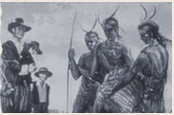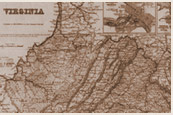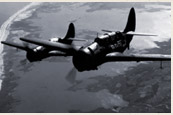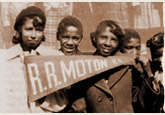"A Trifle Embarrassed" (1898), Political Cartoon
University of Hawai'i Kapi'olani Community College Library: Political Caricatures of the Hawaiian Kingdom, 1875-1905
"The White Man's Burden" (1899), Poem
University of Texas: Online Texts
Theodore Roosevelt's Inaugural Address (1905), Speech
Avalon Project at Yale Law School
Description: These resources consist of widely-differing items--a political cartoon from McKinley's presidency, a poem by Rudyard Kipling, and Theodore Roosevelt's presidential inaugural address--but all share a common timeframe and theme. All three appeared within seven years of each other during the "Age of Empire" and all make reference to the belief in cultural and racial supremacy that was implicit in the tenets of American imperialism. These resources allow students to probe this cultural attitude from several standpoints and examine some of its historic manifestations.
Teaching Tips:
"Do Now" Suggestion
- Students could brainstorm a list of words or phrases they associate with colonialism. Students might brainstorm two lists, one from the perspective of pro-colonial Europeans, the other from the perspective of anti-colonial inhabitants of colonized lands. After sharing their lists, students could read the poem. Students could read the first stanza of the poem, and respond in their journals to the prompt, "What do you think Kipling means by 'White Man's Burden?'" After sharing their responses, students could read the remainder of the poem. Students could respond to a journal prompt regarding inaugural addresses. Two suggestions are "If you were president, what are some of the promises or statements you would make in your inaugural address?" or "What are some of the concerns and goals you think Theodore Roosevelt had, when he began his second term in 1905? After sharing their responses, students could read Roosevelt's address, then discuss how the speech compared or differed from their responses.
- After engaging in a close reading of the poem as a class or in groups, students could write a "Response Poem," from a perspective different than Kipling's- of a more pro-colonial European, of an anti-colonial native inhabitant of a colonized area, etc. Students could illustrate and share their responses with the class. Groups of students could rewrite stanzas of the poem into their own words, either as a poem, or as prose. Groups could interpret different stanzas, or each group could interpret the entire poem. Students could then share their responses with the class. Students could use their text and other resources to compile a list of U.S. foreign and domestic policy actions during Roosevelt's 1905-1908 presidential term, which they could list or include in a timeline. Students could then read the inaugural address, and identify statements Roosevelt made that either support or contradict actual U.S. policies in the next four years. Students could then choose one of these policies, and write about or discuss the similarities or differences in Roosevelt's stated policy, and U.S. actions.



